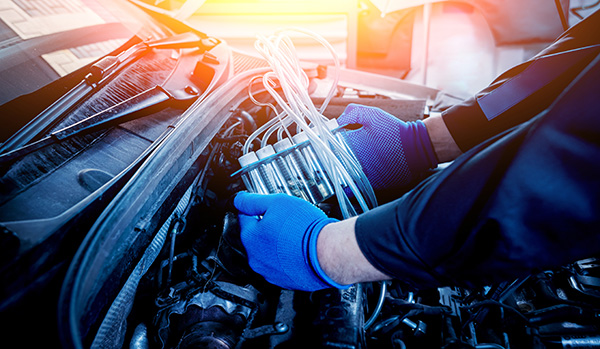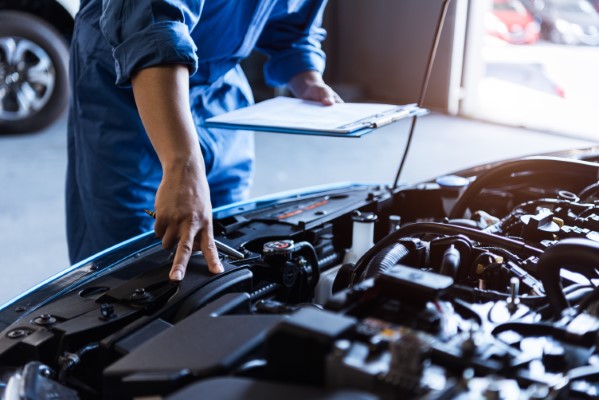Posted on 3/28/2024

Keeping your car's fuel system in top condition is essential for optimal performance and fuel efficiency. From the fuel tank to the engine, every component plays a crucial role in ensuring a smooth and reliable driving experience. Keep Your Fuel Tank Full Maintaining a full or near-full fuel tank can help prevent condensation from forming inside the tank, reducing the risk of water contamination in the fuel system. Running your car on low fuel levels can cause the fuel pump to work harder, leading to premature wear and potential failure. Aim to keep your fuel tank at least half full whenever possible. Regular Fuel Filter Replacement Your car's fuel filter removes impurities and contaminants from the fuel before it reaches the engine. Over time, the filter can become clogged with dirt and debris, affecting engine performance and fuel efficiency. To prevent this, it's essential to replace the fuel filter at regular intervals as your ... read more
Posted on 2/29/2024
.jpeg)
Ever felt like your car has a mind of its own, veering off course or pulling to one side? It might not be your imagination playing tricks on you. Your wheels could be crying out for attention, signaling that they're in dire need of alignment. But how can you decipher these subtle messages your car sends? Let's explore seven unmistakable signs that your wheels are begging for alignment. 1. Telltale Sign of Misalignment Take a moment to inspect your tires. Do you notice uneven tread wear, with one side wearing down faster than the other? This uneven wear pattern is a clear indicator that your wheels are out of alignment. When your wheels aren't properly aligned, they exert uneven pressure on the tires, causing premature wear and tear. 2. Persistent Pulling or Drifting Have you ever felt like your car has a mind of its own, drifting to one side eve ... read more
Posted on 1/27/2024
.jpeg)
The Ford F-150, renowned for its durability and performance, is a favorite among truck enthusiasts. However, to ensure its longevity and maintain its top-notch condition, regular maintenance is key. Here are nine essential tips to keep your Ford F-150 running smoothly. Regular Oil Changes One of the simplest yet most crucial steps in maintaining your F-150 is regular oil changes. Engine oil lubricates, cleans, and cools the internal components of your engine. Depending on your model and the type of oil used, change the oil every 5,000 to 10,000 miles. Tire Maintenance Your tires are the only point of contact between your truck and the road. Regularly check the tire pressure and keep them inflated to the recommended PSI. Also, get them rotated and balanced every 5,000 to 8,000 m ... read more
Posted on 12/5/2023
.jpeg)
Ensuring your vehicle glides smoothly on the road isn't just about the engine or brakes—it's also about the often-overlooked aspect of tire pressure. In this guide, we demystify the world of tire pressure, shedding light on why it matters and how to maintain the correct levels for a safer and more efficient ride. The Significance of Correct Tire Pressure Tire pressure plays a pivotal role in the overall performance of your vehicle. Maintaining the manufacturer-recommended pressure ensures proper traction, even tire wear, fuel efficiency, and optimal handling. When your tires are inflated to the right level, you're not only enhancing safety but also maximizing the lifespan of your tires. Finding the Manufacturer's Recommended Pressure Locating the correct tire pressure for your vehicle isn't a guessing game. To do so, refer to your vehi ... read more
Posted on 11/29/2023

Clink, clank, wheeze... Does that sound painfully familiar every time you coax your beloved car to life? You can almost feel its desperate need for a little tender love and care – as if it's pleading for a day at the spa. A tune-up is akin to a revitalizing retreat for your vehicle; it's that critical rejuvenation process designed to ensure your car breathes effortlessly, purrs contentedly, and remains the reliable companion you need it to be. If conversations at mechanic shops leave you feeling out of depth, or if talk of 'ignition timing' makes your eyes glaze over - fear not! Here is everything you need to know: Recognizing Tune-Up Signs Back in the old days, when cars guzzled fuel, vehicles required constant tuning. However, today's savvy engines have extended their pampering period's magnitude further than their an ... read more
Posted on 10/29/2023

Rumbling along the highways or navigating through the bustling streets, diesel vehicles have long been the backbone of the automotive world. But amidst their dominance, one critical distinction often takes the backseat: the difference between light and heavy-duty diesel vehicles. Beyond the surface-level variance in size, these automotive titans possess unique features that contribute to their specialized roles. Join us as we go into the intricate mechanics and functionalities, deciphering the essence of these automotive powerhouses. Understanding the Basics In the realm of diesel vehicles, the distinction between light and heavy-duty engines lies primarily in their intended purpose and construction. Light-duty diesel vehicles, typically represented by smaller trucks, SUVs, and personal cars, are designed for everyday use, offering better fuel efficiency and maneuverability. On the flip side, heavy-duty diesel vehicles, such as commercial trucks and buses, ar ... read more
Posted on 9/29/2023

Your vehicle is more than just a mode of transportation; it's your trusted companion on countless journeys, a reflection of your personality, and a source of pride. However, like any relationship, it requires care and attention to ensure it continues to serve you faithfully. There comes a time when your vehicle whispers signs that it's ready for a transformation, an overhaul to rejuvenate its performance and extend its life. The Overhaul Advantage: An overhaul goes beyond just fixing issues; it's a comprehensive transformation that can breathe new life into your vehicle. It typically involves a thorough inspection, replacement of worn-out components, and tuning of the engine and transmission, and often includes an aesthetic facelift. 1. Strange Noises from the Engine Your engine is the heart of your vehicle, and when it starts making unusual noises - knocking, rattling, or clunking - it's a clear cry for help. These noises can indic ... read more
Posted on 8/31/2023

As the summer season is at its halfway point, many of us are gearing up for road trips and long drives in the sunshine. But have you ever stopped to consider how the heat of summer affects the fluids inside your vehicle? From engine oil to transmission fluid, the summer heat can cause significant changes to the viscosity and performance of these essential fluids. Engine Oil Engine oil is your car's lifeblood, ensuring smooth operation and protection against friction. High temperatures can cause the oil to thin out, reducing its effectiveness in lubricating vital engine components. Thinner oil may struggle to maintain proper pressure, potentially leading to engine overheating and accelerated wear. Coolant Coolant, also known as antifreeze, plays a pivotal role in maintaining your engine's temperature. When the heat intensifies, coolant can evaporate more quickly, potentially causing your engine to overheat. Moreover, prolonged exposure to ex ... read more
Posted on 7/31/2023

Behind every smooth and comfortable ride lies a complex suspension system that absorbs road irregularities and keeps the vehicle steady. Countless parts go unnoticed, but today we will shed light on one of them, or more correctly, five that carry the same function. We are talking about bushings. These small rubber or polyurethane components play a crucial role in maintaining stability, reducing vibrations, and enhancing driving comfort. Let's take a look at the different types and what they do. Control Arm Bushings Control arm bushings are among the most common types found in suspension systems. These bushings are installed between the control arms and the vehicle's frame or subframe. They allow the control arms to pivot smoothly, facilitating the wheels' vertical movement. Control arm bushings are crucial for maintaining proper suspension geometry and ensuring the wheels remain perpendicular to the road surface, thus enhancing stability and contro ... read more
Posted on 6/30/2023

When it comes to increasing the power output of an engine, turbochargers, and superchargers are two popular options. Both of these devices are designed to force more air into the engine, resulting in improved performance. What is the difference between them, you might ask? Well, if you continue reading you will learn about exactly that. The Main Difference The primary difference between a turbocharger and a supercharger lies in how they compress the incoming air. A turbocharger is driven by exhaust gasses generated by the engine. It consists of a turbine and a compressor wheel conne ... read more